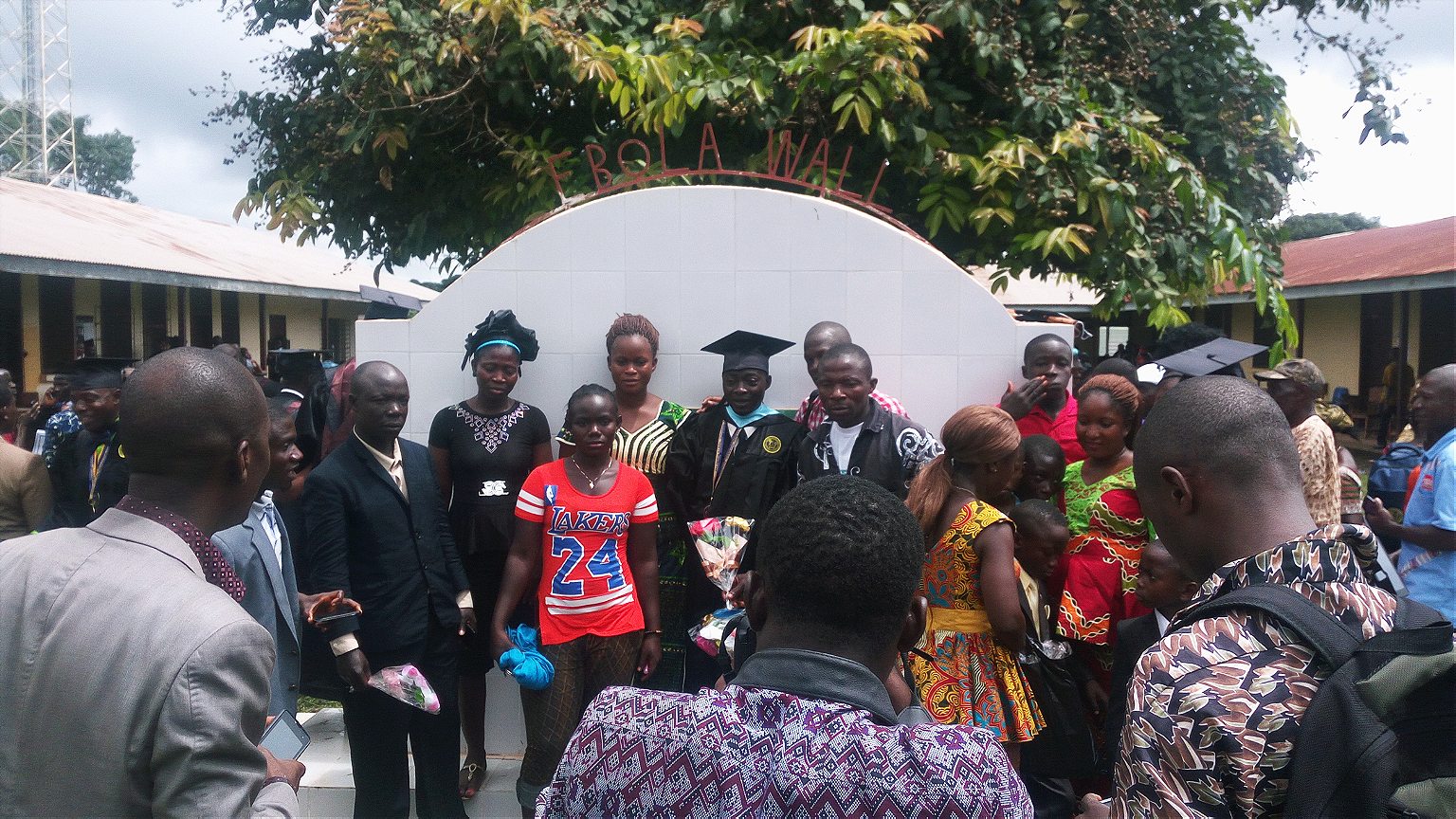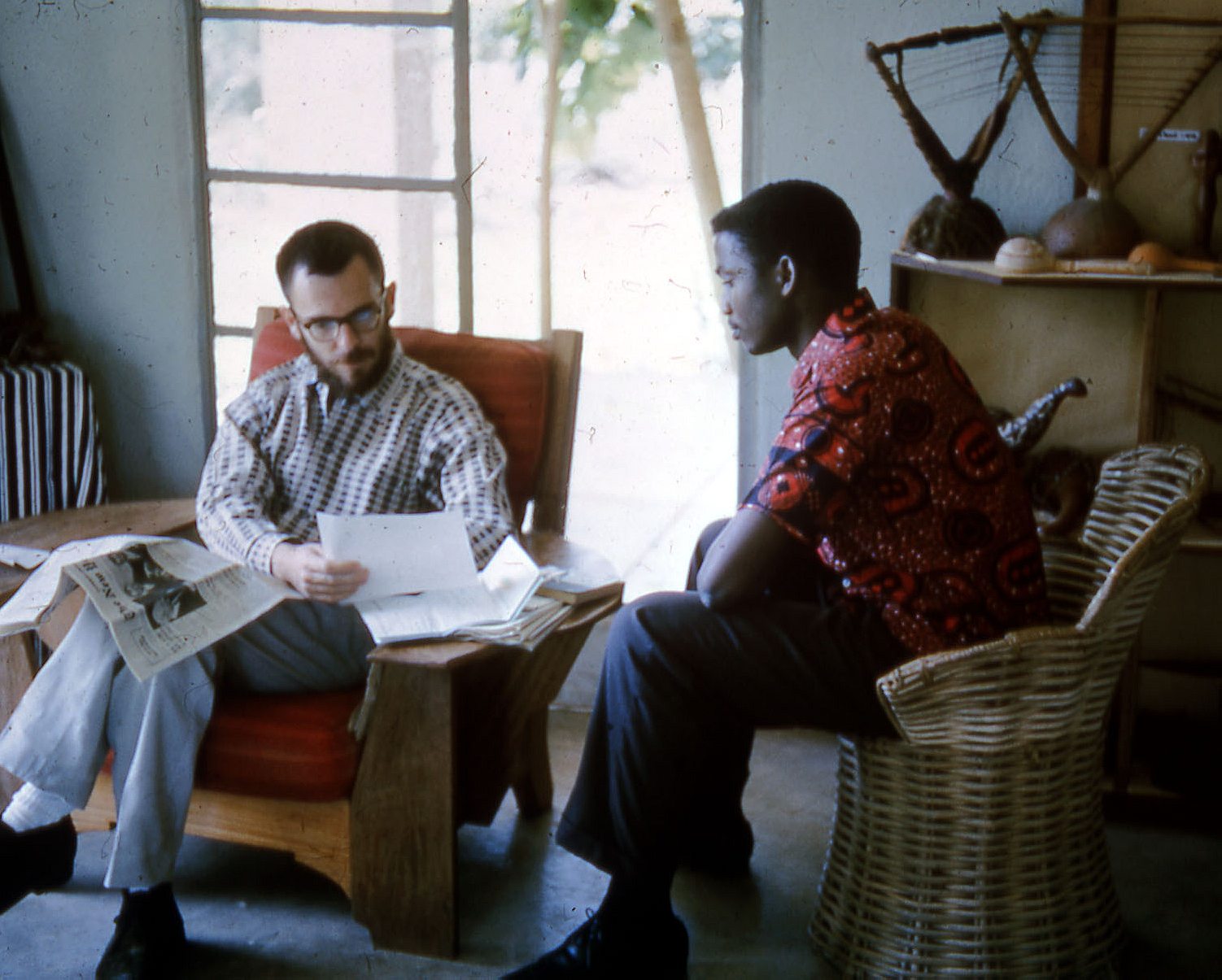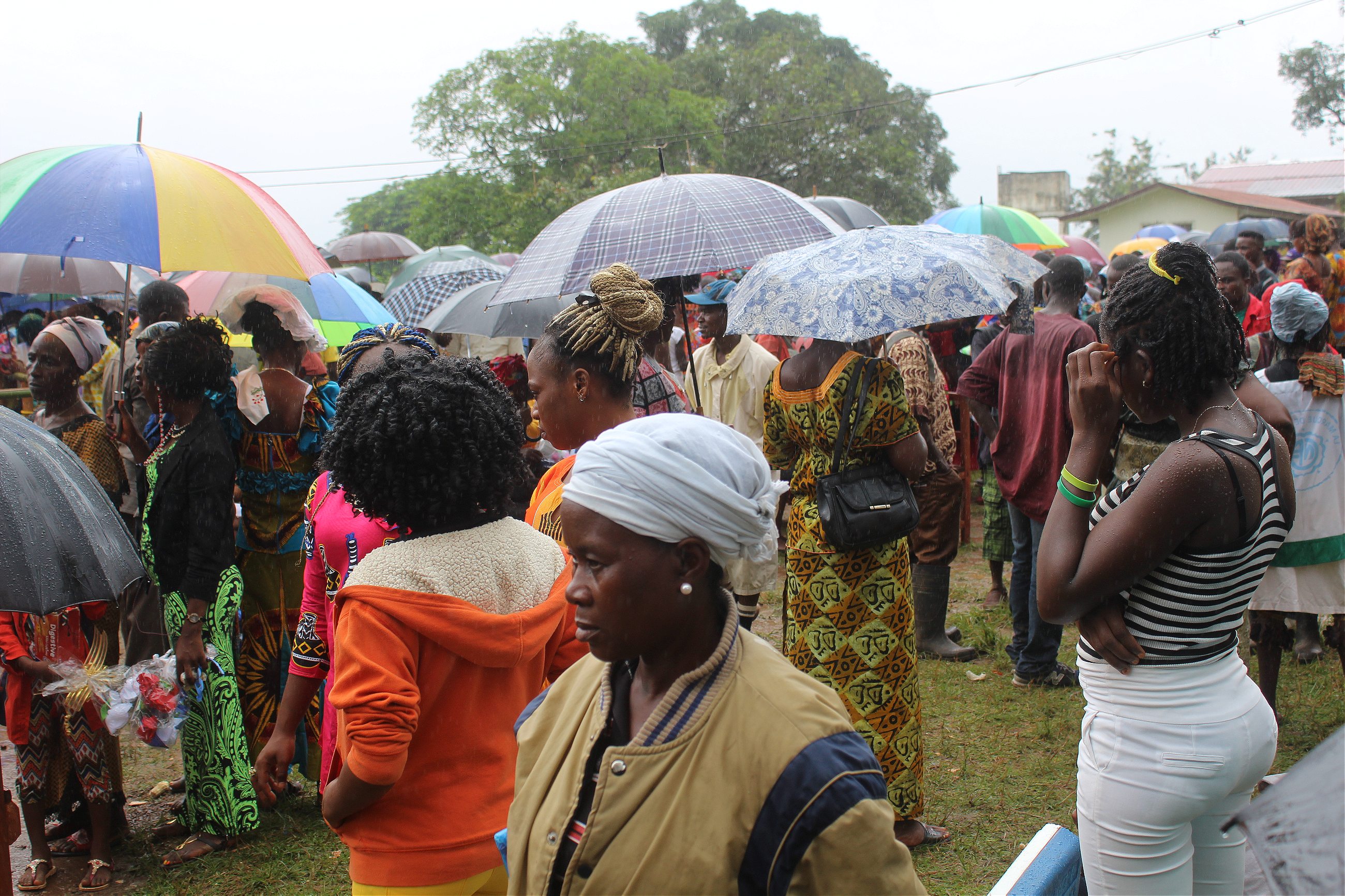Commencement on the campus that survived the Liberian civil war, and the Ebola epidemic.
SUAKOKO, Liberia—
At the end of July, just days after Liberia celebrates its independence day, the festivities continue for some when one of Africa’s oldest private universities holds its commencement ceremony. Carloads of Liberians flock from the coastal capital, Monrovia, to the campus of Cuttington University to celebrate the occasion each year. Thanks to a recent Chinese-led rehabilitation of the highway, the three-hour trip is one of the nation’s smoothest.
Urban Liberians use the trip to stock up on cheap produce from rural roadside markets and enjoy sampling fresh and frothy palm wine that women and children hawk from repurposed cooking oil cans. On the sidelines of the commencement ceremony, school marching bands and dance troupes perform for donations.
Refreshments are provided by a bevy of vendors selling cold beverages from coolers loaded into wheelbarrows and spicy kebabs from translucent plastic buckets perched on their heads. Vendors, entertainers, students, and guests commingle on the undulating grassy fields that constitute the campus, with parked cars (and a few stretch Hummers) sprawling as far as the eye can see.
The upbeat mood masks the struggle to keep Cuttington University running. The campus was the site of intense fighting during the Liberian civil war, and a number of ruined buildings dot the school grounds. “The civil war destroyed everything,” says Melvin Mason, a former university president and one of its oldest living graduates.
Other kinds of devastation are more recent: A wall at the heart of campus pays tribute to the 19 faculty and graduates who lost their lives during the Ebola crisis, which began in 2014 and only officially ended, according to the World Health Organization, in summer 2015. Following the ceremony, dozens of new graduates posed for pictures in front of the commemorative “Ebola Wall.”

Cuttington University was established in 1889—several decades after the country declared independence—by the Episcopal Church of the United States. It is one of the oldest private universities in Africa. Although a number of prominent Americans were behind the founding of Liberia (it was seen as a way to reduce the population of free black people in the U.S., and the capital was renamed in tribute to the largesse of U.S. President James Monroe), American government support of Liberia was marginal and inconsistent.
As a result, religious authorities came to play an outsized role in the development of the new country. Cuttington was founded by Samuel Ferguson, the first black bishop of the Episcopal Church of the United States. Born to a slave mother in Charleston, South Carolina, Ferguson immigrated to Liberia at a young age. His initiative to bring tertiary education to the young country was supported by Robert Cutting, a New York philanthropist and Episcopal layman whose $5,000 bequest got the school named in his honor.
The present-day campus of Cuttington University opened in 1949 across the country from its original site at Cape Palmas, near the border with the Ivory Coast. After two decades of suspended operations, the government of President William Tubman donated 1,500 acres to the Episcopal Church to spur its renaissance. Contrary to popular belief, operations weren’t suspended because of the depression or the Second World War. According to Elwood Dunn (a graduate of the university and one of Liberia’s most renowned intellectuals), students walked out en masse because a white administrator made the students conduct endless military drills and refused to hold classes.
From a class of three in 1949, the school enrolled 245 students by 1967. More than 20 percent of faculty held Ph.D.s, dwarfing the numbers at any Liberian university today. It had the best library the country had ever known, facilitated by donations from the Ford Foundation. As one of the few private colleges in Africa during the 1960s, the university attracted a considerable number of students from across the continent. Students from southern African nations that continued to endure minority rule—South Africa, Zimbabwe, Angola—found refuge at Cuttington, often supported by United States Agency for International Development scholarships.
Star pupils from Ghana and Sierra Leone were attracted to the school by the number of students who went on to graduate study in the United States. “The campus was an exciting place in which to teach and learn, largely because of the mix of students from across Africa,” says John Gay, an Episcopal missionary with long-standing ties to the university.

An Africana museum was established with contributions from Peace Corps volunteers. It would be looted during the war. The Cuttington campus was also the site of burgeoning dissent against the aging Liberian president, William Tubman. Several Peace Corps volunteers who delivered anti-government lectures were expelled in the late 1960s. One of them, Nicholas Stroh, was killed in Uganda a few years later. Reports indicated that he may have been working on behalf of the CIA.
Timothy Nevin, one of the few American faculty members presently at the university, notes that, “Cuttington has historically been the most prestigious private university in Liberia.” Nevin lives on campus in a residence that may once have been world-class. Now, however, his bottom step has mostly washed away, and the air conditioning rarely works. Nevin’s go-to meal, when he wants food from home, is cheesy pasta from black-market U.N. combat ration packs.
Everybody I spoke to said that the university is still struggling with the aftermath of Liberia’s debilitating 14-year civil war, which started in 1989. For most of the war, Gbarnga—a city just 8 miles away from Cuttington University—became the capital of Greater Liberia. Greater Liberia was a vast tract of the country controlled by the warlord Charles Taylor during the conflict.
Under pressure from the government to project an image of business as usual, the school had opened for a new term in April 1990 as war raged to the north. Weeks later, the university’s acting president was detained and pressured to provide information on students and faculty thought to be hostile to the government.
Two competing rebel groups fought on Cuttington’s campus
Just days later, the government lost control of the university, and in June two competing rebel groups fought on Cuttington’s campus. Taylor’s faction won out and adopted the university as a training base, infamously hosting many child soldiers.
It’s estimated that in just three months, the rebels caused $4 million in damages. Some staff stayed on campus to protect the facilities. In an effort to maintain Taylor’s favor, they hosted a number of meetings of the warlord’s political wing, a strategy that didn’t pay off, as the university would be closed until 1998.
In mid-2002, a renewed burst of conflict caused the school to close once again. The Taylor government provided a police convoy to escort nearly 1,000 faculty and students to Monrovia where classes would continue. The campus reopened in August 2004.
After a decade of reconstruction, the school suffered yet another shock, closing again in 2014 due to the public health crisis induced by the Ebola virus. Just a short distance from one of the country’s largest hospitals, Cuttington played a major role in curbing the spread of the disease.
Many graduates of the school’s nursing program were at the forefront of the battle against the disease. A number of international responders were housed at Cuttington, and the U.S. Navy established an Ebola testing unit on the campus, one of the few located outside of Monrovia.
In early 2015 as Ebola abated, Cuttington reopened, but it’s still a long way from recapturing its past glory. Long gone are the days when the university had a first-class library. Paular Paul, class of 2015, laments that her coursework relied on “ancient books that are of no use to the current lesson being taught.” Sexual harassment from teachers also hindered her studies. A 2011 survey by a nongovernmental organization found that 85 percent of female university students in Liberia had been pressured by faculty for sex in return for grades or other favors.

Recent Cuttington graduates have spent most of their childhoods surrounded by war or as refugees in neighboring countries. One professor told me that many read at just a fifth-grade level. It’s a nationwide problem: In 2013, not a single applicant passed the entrance exam at the University of Liberia, the nation’s leading public university.
Today, Cuttington University’s unassuming campus, bisected by a dirt road riddled with potholes, gives little indication of the school’s critical role in Liberian and American history. The sprawling campus looks like a neglected rural research station. There are single-story concrete classrooms with rusty tin roofs.
The commencement crowds, on the other hand, are immaculate. Young women wear tailor-made, form-fitting dresses and immaculately coiffed hair, while men sporting fresh haircuts somehow maintain spotless, shined shoes despite the mud.
The graduation ceremony itself is conducted under a partially enclosed hutlike auditorium. It cannot begin to accommodate the visitors who came to celebrate with the 689 graduates, who are decked out in black caps and gowns. July is the peak of the rainy season and guests at the back of the auditorium get soaked while listening to speeches distorted by bullhorns. The commencement speaker was Oswald Tweh, class of 1984, a prominent Liberian lawyer with a graduate degree from Harvard. He spoke passionately about education reform and ethics.
Despite its shortcomings, for many Cuttington provides the closest thing to a traditional university experience in Liberia. As the determined efforts to rebuild the Africana museum and other campus facilities illustrate, Liberia’s homegrown initiative is thriving. While its students lack basic resources, they’re determined to be the generation that rebuilds the country. For now, Cuttington is the best place to start.
